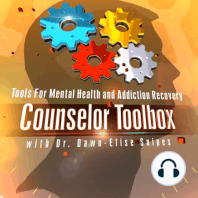49 min listen

Behavior Modification Tools to Address Obsessions, Cravings and Addictive or Compulsive Behavior
Behavior Modification Tools to Address Obsessions, Cravings and Addictive or Compulsive Behavior
ratings:
Length:
66 minutes
Released:
Oct 12, 2021
Format:
Podcast episode
Description
Behavior Modification Tools for Obsessions, Cravings and Addictive or Compulsive Behavior #behaviormodification #NCMHCE #OCD
NOTE: ALL Podcasts are for educational purposes only and are NOT a replacement for medical advice or counseling from a licensed professional.
Objectives Review basic behavior modification interventions and their utility with addictive and compulsive behaviors Baseline To understand a behavior you first need to understand the Frequency Intensity Duration Vulnerabilities PACER proximal triggers (Discriminative stimuli) Behaviors Obsessions/cravings or compulsions/addictive behaviors that take more than 1 hour per day and/or cause clinically significant distress OCD: thoughts about…; Counting, checking, washing… Body Dysmorphic: thoughts about…; Fixing, covering up, checking Addictions: thoughts about…; using Recovery Sleep, exercise, nutrition, pain management; biofeedback Happiness promoting Positive thinking Working Toward Change Natural consequences Rewards / Reinforcement (Individualized) Increase the likelihood of a behavior Positive Reinforcement Adding something positive What positive consequences exist if you change your behavior? (PACER) Negative Reinforcement Taking away something unpleasant What unpleasant thing will be removed if you change your behavior? (PACER) DEcrease the likelihood of a behavior Positive Punishment Adding something negative Functional Analysis Explores the vulnerabilities and triggers for and functions of the behavior Behavioral Alternatives 3:1 When you remove a behavior replace with a menu of 2 or three others Competing Responses (Hint: Look for exceptions) Chew gum while cooking Crochet while watching television Journaling instead of checking Playing with your kids instead of smoking Sing when going over a bridge Call a friend/sponsor when triggered Nicotine gum Aversion Drinking: Antabuse Non-hunger eating: Only keep low preference foods available (celery, rice cakes) Compulsive behaviors: Pushups, squats, hold ice cubes, rubber band snap, pictures to remove the desire Response (Delay) Prevention Journaling (book, online, checklist) What, why, alternatives Calling friend/sponsor Time delay and distress tolerance activities Distance Website firewalls and internet lockouts Don’t keep substance in the house Successive Approximations Goal is to stop the addictive or compulsive behavior Reduce frequency, intensity or duration Smoking Non hunger eating Ruminating / “obsessing” Checking Picking / Hair pulling Scaffolding Scaffolding is similar to successive approximations, but uses a support to help you get the rest of the way to your goal Get as far as you can then call your sponsor/coach Notice Stop Choose an alternative Do the alternative (get into your wise mind) Evaluate the triggers and vulnerabilities and identify ways to prevent the problem in the future Summary Behaviors are triggered by PACER discriminative stimuli Vulnerabilities make people more likely to be triggered by discriminative stimuli Behavior modification seeks to Implement new rewarding behaviors that are desirable and either prevent vulnerabilities or aid the person in coping with distress Make undesirable behaviors less rewarding
NOTE: ALL Podcasts are for educational purposes only and are NOT a replacement for medical advice or counseling from a licensed professional.
Objectives Review basic behavior modification interventions and their utility with addictive and compulsive behaviors Baseline To understand a behavior you first need to understand the Frequency Intensity Duration Vulnerabilities PACER proximal triggers (Discriminative stimuli) Behaviors Obsessions/cravings or compulsions/addictive behaviors that take more than 1 hour per day and/or cause clinically significant distress OCD: thoughts about…; Counting, checking, washing… Body Dysmorphic: thoughts about…; Fixing, covering up, checking Addictions: thoughts about…; using Recovery Sleep, exercise, nutrition, pain management; biofeedback Happiness promoting Positive thinking Working Toward Change Natural consequences Rewards / Reinforcement (Individualized) Increase the likelihood of a behavior Positive Reinforcement Adding something positive What positive consequences exist if you change your behavior? (PACER) Negative Reinforcement Taking away something unpleasant What unpleasant thing will be removed if you change your behavior? (PACER) DEcrease the likelihood of a behavior Positive Punishment Adding something negative Functional Analysis Explores the vulnerabilities and triggers for and functions of the behavior Behavioral Alternatives 3:1 When you remove a behavior replace with a menu of 2 or three others Competing Responses (Hint: Look for exceptions) Chew gum while cooking Crochet while watching television Journaling instead of checking Playing with your kids instead of smoking Sing when going over a bridge Call a friend/sponsor when triggered Nicotine gum Aversion Drinking: Antabuse Non-hunger eating: Only keep low preference foods available (celery, rice cakes) Compulsive behaviors: Pushups, squats, hold ice cubes, rubber band snap, pictures to remove the desire Response (Delay) Prevention Journaling (book, online, checklist) What, why, alternatives Calling friend/sponsor Time delay and distress tolerance activities Distance Website firewalls and internet lockouts Don’t keep substance in the house Successive Approximations Goal is to stop the addictive or compulsive behavior Reduce frequency, intensity or duration Smoking Non hunger eating Ruminating / “obsessing” Checking Picking / Hair pulling Scaffolding Scaffolding is similar to successive approximations, but uses a support to help you get the rest of the way to your goal Get as far as you can then call your sponsor/coach Notice Stop Choose an alternative Do the alternative (get into your wise mind) Evaluate the triggers and vulnerabilities and identify ways to prevent the problem in the future Summary Behaviors are triggered by PACER discriminative stimuli Vulnerabilities make people more likely to be triggered by discriminative stimuli Behavior modification seeks to Implement new rewarding behaviors that are desirable and either prevent vulnerabilities or aid the person in coping with distress Make undesirable behaviors less rewarding
Released:
Oct 12, 2021
Format:
Podcast episode
Titles in the series (100)
020- Protective Factors for the Development of Co-Occurring Addiction and Mental Health Issues: Mental Health and Addiction issues often go hand-in-hand. Effective recovery involves not only minimizing risk factors, but also enhancing protective factors within the individual and the individuals family, work, and community environment. This episod by Counselor Toolbox Podcast with DocSnipes